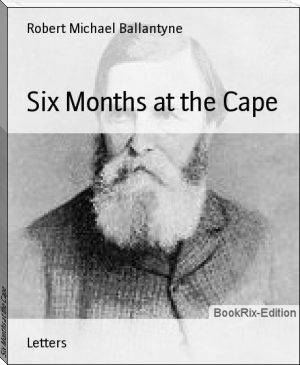Six Months at the Cape - Robert Michael Ballantyne (the little red hen ebook txt) 📗

- Author: Robert Michael Ballantyne
Book online «Six Months at the Cape - Robert Michael Ballantyne (the little red hen ebook txt) 📗». Author Robert Michael Ballantyne
Soon we perceived two of our comrades driving a flock of springboks towards the river. Mike at once diverged towards a clump of bushes which it seemed probable they would pass. In ten minutes we were down in a hollow, with the horses hid behind a mimosa-thorn. The boks had not seen us, being too much taken up with their pursuers; they came straight towards us.
"Now, sar," whispered Mike once again, while his eyes glared with glee, "_now's_ you chance!"
I went down on one knee, carefully sighted the rifle, and looked up. The foremost bok was within good range. I fired and missed! "Desolation!" said I, cramming in another cartridge while the flock diverged to the left.
There was no hope now of anything but a running shot. I aimed carefully. The smoke cleared off, the flock dashed on, but--one bok lay prone upon the earth. Bang! went my second barrel, and another bok, leaping into the air, fell, rose, fell again, then rose and ran on.
Mike was now jubilant. The whole internal structure of his mouth was disclosed to view in his satisfaction, as he viewed the prostrate animal. I may add that although we did not find the wounded bok that evening, we found him next day.
With our prize strapped behind Mike's saddle we rode in triumph into camp, a little before sunset, and found most of our companions assembled, busy preparing supper and making other arrangements for camping out on the veldt--as they call the plain. Some had been successful, some had failed, but a good many springboks had been killed, and all were hearty as crickets and hungry as hyenas.
To kindle fires, boil tea, roast venison steaks, spread blankets on the ground, and otherwise attend to the duties of the bivouac, was now the order of the hour. The moon rose while we were thus engaged, and mingled her pale light with the ruddy blaze of camp-fires. We spoke little and ate much. Then followed the inevitable pipe and the pleasant chat, but we were all too ready for rest to care about keeping it up long. I was constrained to take the bed of honour in the cart. The others stretched their limbs on the Karroo, and in ten minutes every man was in the land of nod.
Next day we mounted at daybreak and renewed the hunt, but I will say no more about it than that we bagged twenty-six springboks amongst us, and that Six-foot Johnny, having killed the greatest number of animals, returned home "King of the hunt," with a scrap of ostrich feather in his cap.
LETTER THREE.
SOMERSET--THE BRITISH SETTLERS--ORIGINAL "OWNERS"--NATIVE CHURCH-GOING.
On my way to the Karroo I had to pass through Somerset East, and it so fell out that I fell in with a countryman from Edinburgh, who chanced to be going to Somerset in the same "passenger-cart" with myself. His name must have been a novelty once, though much of its freshness is worn off now--it was Brown.
Our cart had a hood; the roads were very bad, and the behaviour of that hood was stupendous! Its attachment to the cart was, so to speak, partial; therefore it possessed a semi-independent motion which was perplexing. You could not count on its actions. A sudden lurch of the cart to right or left did, of course, carry the hood with it, and, counting on that, you laid your sudden plans to avoid collision; but the elasticity of the hood enabled it to give you a slap on the face before obeying its proper impulse. So, too, it would come down on your head unexpectedly, or, without the slightest provocation, would hit you on the neck behind. I learned with painful certainty in that cart that I had a "small" to my back! It seemed to me that it grew large before the journey was over.
Brown was an intelligent man,--not an unusual state of things with the "Browns." He had two pretty daughters with him, aged eight and twelve respectively. We got on well together, and crossed the Zuurberg range in company on the last day of the year.
It was over passes in this range that the settlers of 1820 went in long trains of Cape wagons, with wives and little ones, and household goods, and civilised implements of husbandry, and weapons of defence, with high hopes and strong courage, and with their "lives in their hands," to subdue the wilderness. It was from these heights that they looked over the beautiful and bush-clad plains of "Albany," which lay before them as the lot of their inheritance.
The breaking up and scattering of the various "parties" was most eloquently and graphically told by the Reverend H.H. Dugmore in a lecture delivered at Grahamstown, on the occasion of the "British Settlers' Jubilee," in May 1870--fifty years after the arrival of the "fathers." [See Note 1.] I quote one passage, which gives a good idea of the manner in which the land was taken up.
"And now the Sunday's River is crossed, and the terrible old Ado Hill is climbed, and Quaggas Flat is passed, and the Bushman's river heights are scaled. The points of divergence are reached, and the long column breaks into divisions. Baillie's party made their way to the mouth of the Fish River, where, it was said, the `Head' had been allowed to choose a territory, and where he hoped to realise imaginations of commercial wealth by founding a seaport town. And the Duke of Newcastle's proteges from Nottingham took possession of the beautiful vale of Clumber, naming it in honour of their noble patron. And Wilson's party settled between the plains of Waay-plaats and the Kowie bush, right across the path of the elephants, some of which they tried to shoot with fowling-pieces. And Sefton's party founded the village of Salem, the religious importance of which to the early progress of the settlement, is not to be estimated by its present size and population. These four were the large parties. The smaller ones filled up the intervening spaces between them. Behind the thicket-clad sandhills of the Kowie and Green Fountain, and extending over the low plains beyond Bathurst, were the locations of Cock's, Thornhill's, Ostler's, Smith's, and Richardson's parties. Skirting the wooded Kloofs from Bathurst towards the banks of the Klienemonden, were ranged the parties of James and Hyman. It was the latter who gravely announced to Captain Trapps, the Bathurst magistrate, the discovery of `precious stones' on his location; and which the angry gentleman, jealous of the reserved rights of Government, found, on further inquiry, were only `precious big ones!' The rich valley of Lushington afforded a resting-place to Dyason's party. Holder's people called their location New Bristol; which never, however, acquired any resemblance to _Old_ Bristol. Passing on towards the front, there were Mouncey's party, Hayhurst's party, Bradshaw's party, Southey's party, stretching along the edge of the wide plains of the Round Hill, and drinking their Western waters. The post of honour and of danger was the line of the Kap River. This was occupied by the party of Scott below Kafir Drift, and by the Irish party above it. The forlorn hope of the entire settlement was Mahony's party at the clay pits, who had to bear the first brunt of every Kafir depredation in the Lower Albany direction. Names thicken as we proceed from Waay-plaats towards Grahamstown. Passing Greathead's location, we come among the men of Dalgairns at Blauw Krantz. Then those of Liversage about Manly's Flats. John Stanley, `Head of all Parties,' as he styled himself, belonged to the same neighbourhood. Turvey's party were in Grobblaar's Kloof; William Smith's at Stony Vale, Dr Clarke's at Collingham. Howard's, Morgan's, and Carlisle's, bring us by successive steps to the neighbourhood of Grahamstown.
"My `reminiscences' are those of an Albany settler; but I do not forget that there was another party, who, though locally separated from the main body, occupied a position, the importance of which developed itself in the after-history of the settlement. I refer to the Scotch party, who were located on the Baviaans River, among mountains and glens that have been rendered classic by the poetry of their leader and historic by the gallant deeds and endurance of his compatriots in the after-struggles of the frontier. I need make no particular reference, however, to the early circumstances of that body of men, as in Pringle's _African Sketches_ they have a most graphically-written history of their own."
Thus, in 1820, was the land overrun and taken possession of by the "British Settlers." It had once been the land of the Hottentots, but had never at any time rightfully belonged to the Kafirs, who, after wrongfully entering it and rendering themselves by their thievish disposition and deceit an unbearable nuisance, were finally driven out of it in 1819.
The idea of Government in sending the settlers out to occupy these vacated lands was, that a convenient buffer might thus be placed on the frontier of the colony to keep the savages in check. That these settlers and their descendants received many a rude shock, and played their part nobly, has been proved, and is admitted on all hands. That they received less encouragement and help from those who induced them to emigrate than might have been expected, is equally certain.
Brown and I chatted, more or less, of these things as we toiled up the slopes of the Zuurberg, where the original settlers had toiled fifty-five years before us, and in the afternoon came to a pretty good inn, where a small misfortune befell us. While we were indulging in a cup of tea, one of our horses escaped. We had crossed the mountain range by that time, and the truant had a fine range of undulating country to scamper over. That animal gave us some trouble, for, although nearly a dozen men went, after him on horseback, he kept dodging about actively with many flourishes of heels and tail during the whole afternoon.
When one is in no hurry, and the weather is fine, a delay of this kind is rather pleasant than otherwise. While men and boys were engaged in the fruitless chase, I wandered off into the bush in the hope of stumbling on a tortoise or a snake, or some other creature that I had previously been accustomed to see in zoological collections, but the reptiles kept close, and refused to show themselves. I came, however, on a gigantic beehive; at least it resembled one in appearance, though the smoke that issued from a hole in its top suggested humanity. There was





Comments (0)